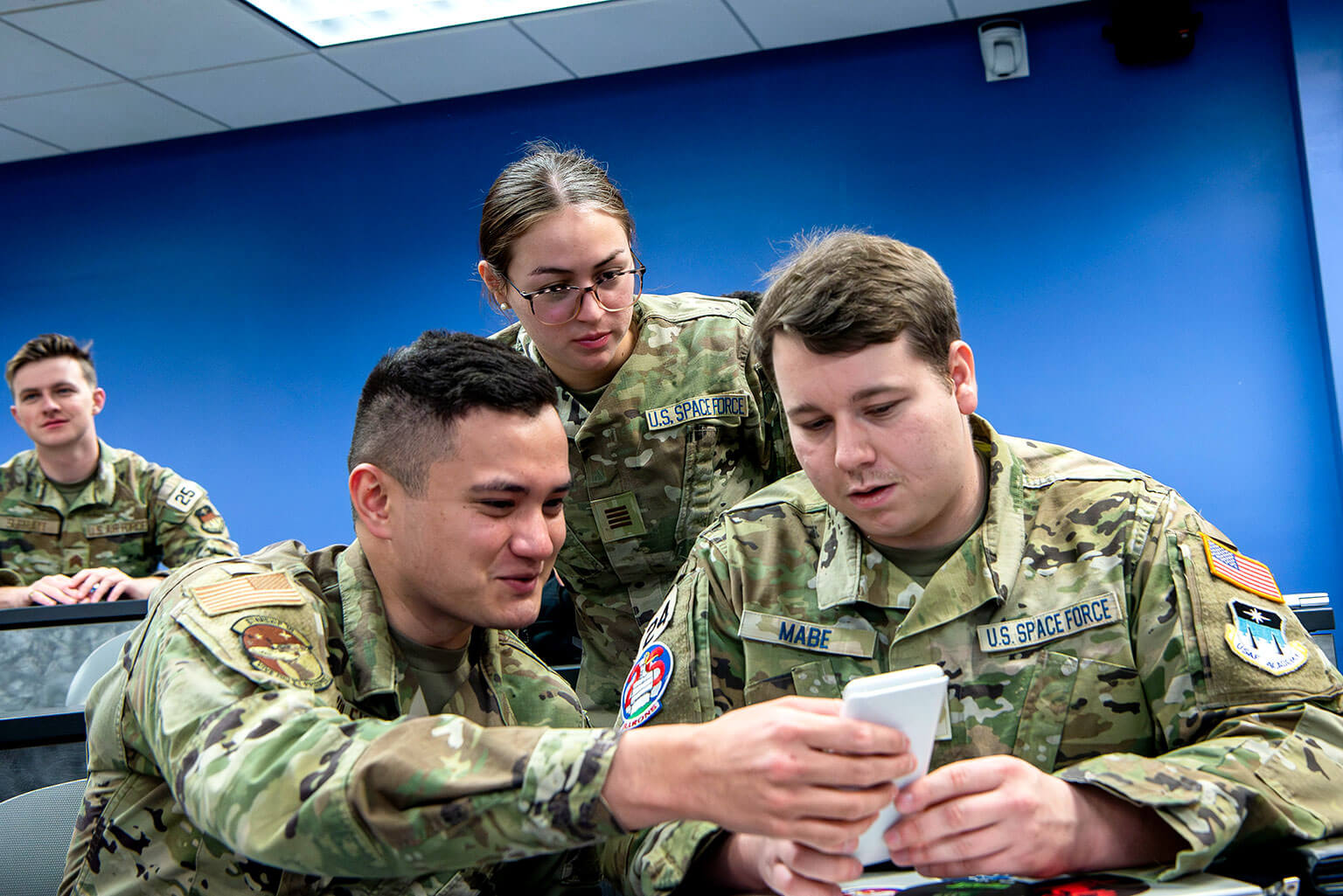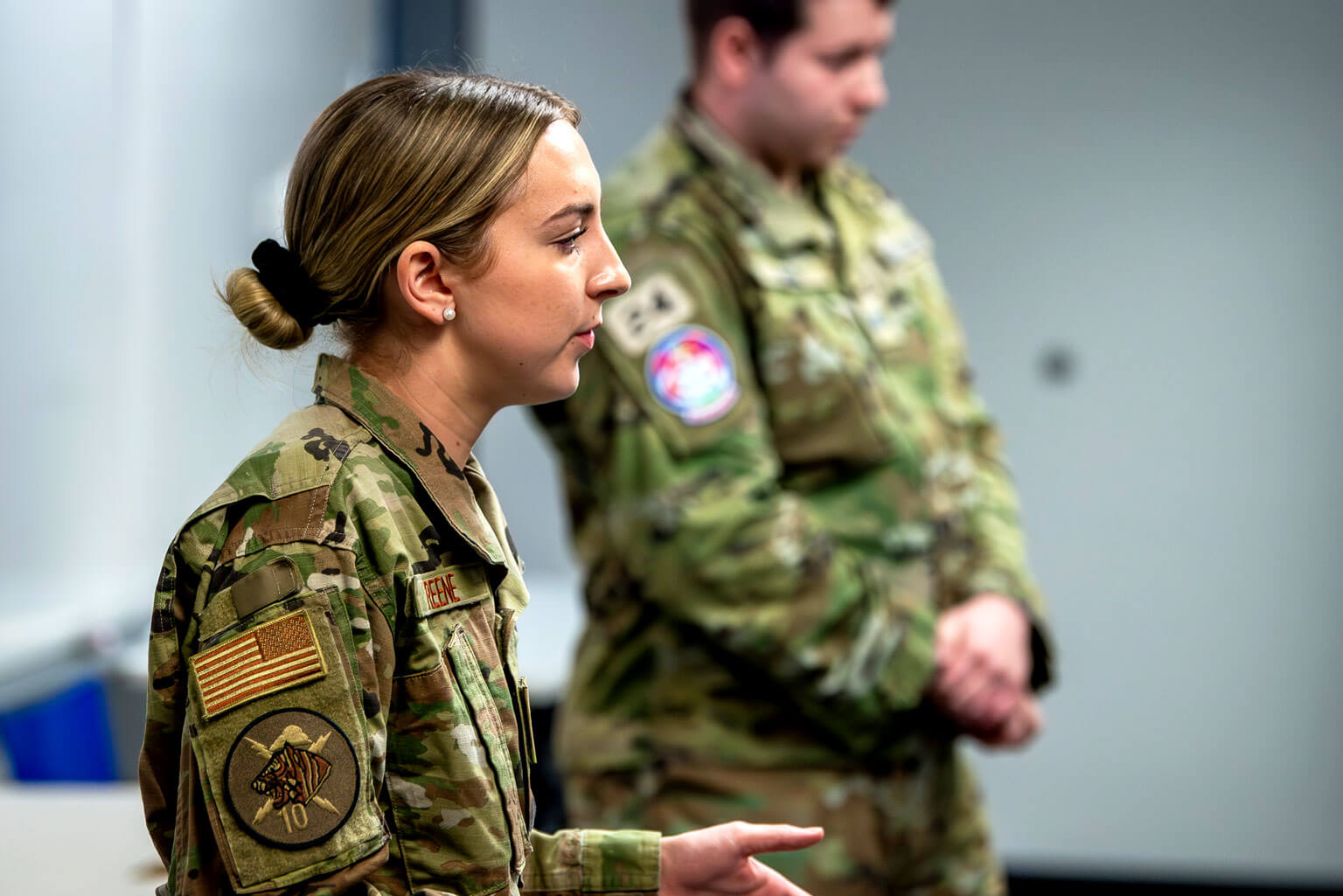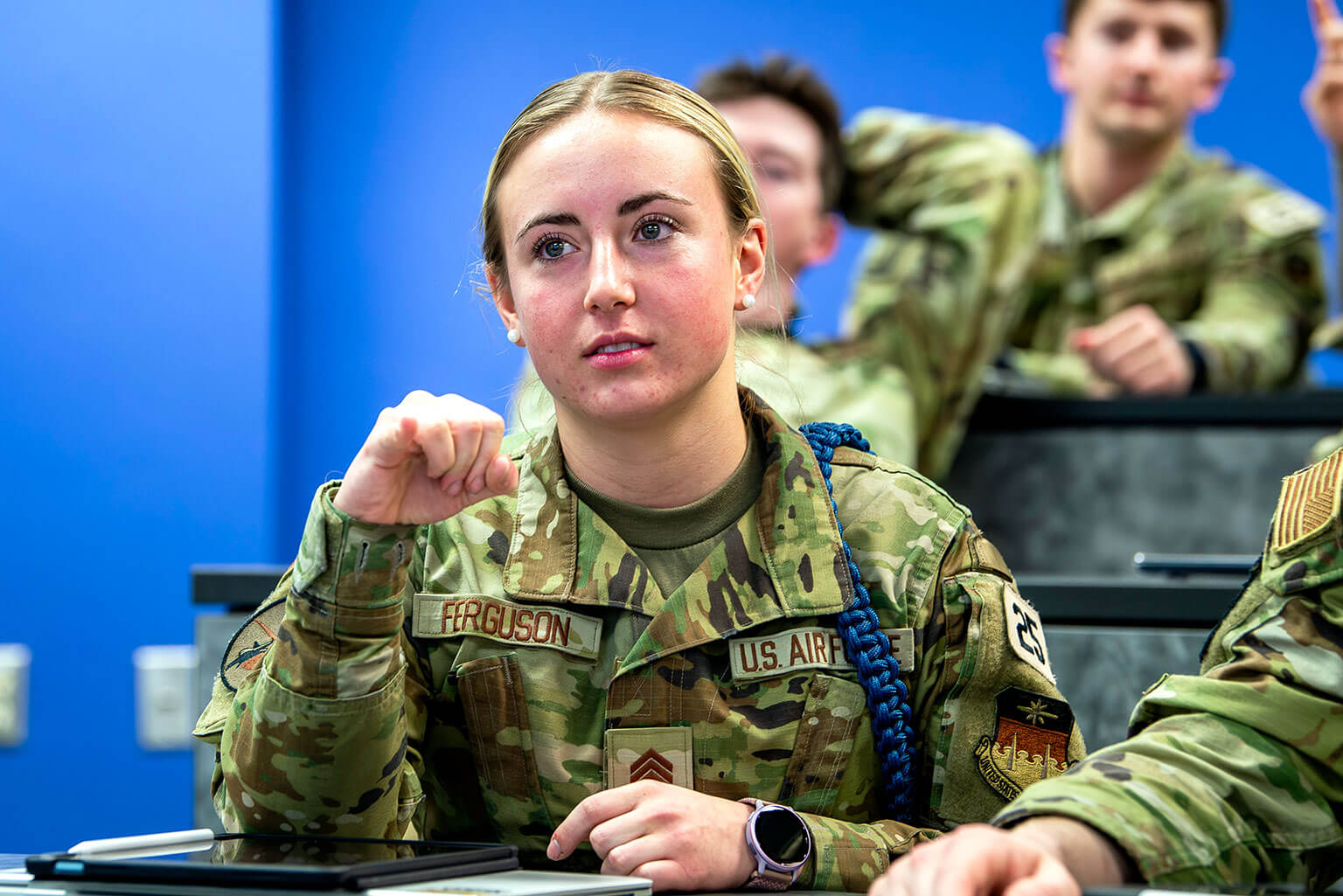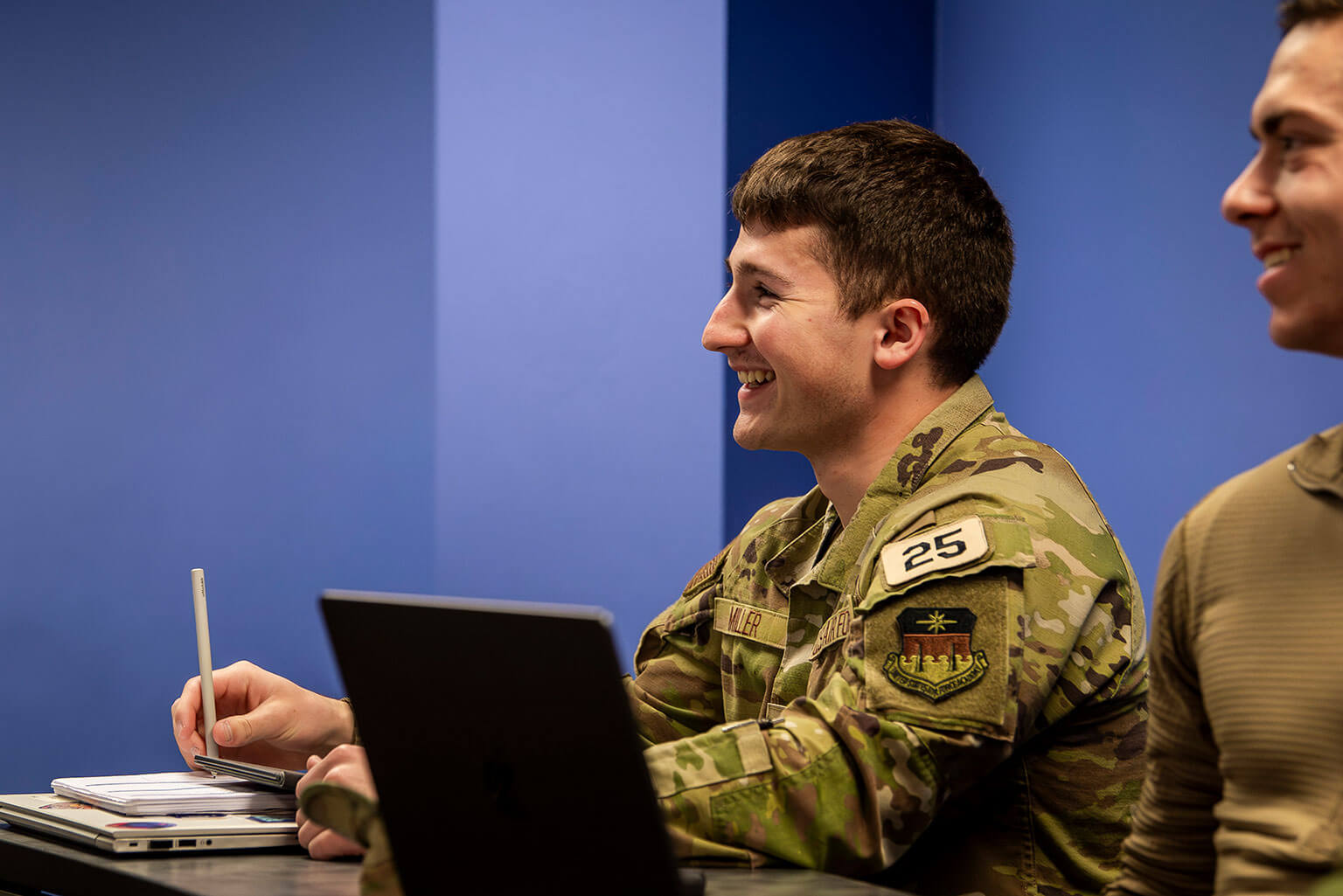Management course transforms cadets into innovators
 Cadets 1st Class Christopher Lindley, left, Trevin Mabe, and Isiskyra Budd watch an exercise on market sizing and analysis during a U.S. Air Force Academy Department of Management Leading Innovation class March 8, 2024. The new experiential course teaches critical innovation theories by applying a customer discovery process to real-world problems. (U.S. Air Force Photo by Justin Pacheco)
Cadets 1st Class Christopher Lindley, left, Trevin Mabe, and Isiskyra Budd watch an exercise on market sizing and analysis during a U.S. Air Force Academy Department of Management Leading Innovation class March 8, 2024. The new experiential course teaches critical innovation theories by applying a customer discovery process to real-world problems. (U.S. Air Force Photo by Justin Pacheco)
By Randy Roughton
U.S. Air Force Academy Strategic Communications
U.S. AIR FORCE ACADEMY, Colo. – A new Department of Management course prepares cadets to lead innovation efforts at their first U.S. Air Force and U.S. Space Force assignments.
The Leading Innovation course is designed to address former Air Force Chief of Staff Gen. Charles Q. Brown Jr.’s call to empower “our incredible Airmen to solve any problem” through an experiential, project-based format, said Lt. Col. T. Daniel White, deputy department head and assistant professor.
“One of the primary things we focus on is teaching cadets to fall in love with the problem rather than the solution,” White said. “We draw heavily on evidenced-based innovation theories and practice to teach cadets how to understand problems from a customer perspective and develop iterative low-cost solutions for experimentation prior to making expensive investments in solutions.”
The course teaches cadets to be innovators and prepares them to lead their Airmen or Guardians to innovate upon graduation. Cadets learn to create an organizational culture that fosters innovation, White said.
Transforming cadets into innovators
Cadets are encouraged to take risks through questioning, observing, networking, experimenting and associational thinking to create innovative ideas. At the course onset, class members are divided into teams of two cadets. They profile innovative organizations to highlight course concepts.
Cadets 1st Class Trevin Mabe, a Military and Strategic Studies major, and Isiskyra Budd, a Civil Engineering major, partnered on a project to streamline the accountability of flightline maintenance tools. They spoke with U.S. Air Force and commercial airline maintainers, asking strategic questions in their quest for innovative solutions. Both cadets expect to become Space Force operations officers after their Academy careers. The cadets said they believe the course prepares them to lead innovation efforts in their first assignment.
“This experience is helping us to learn to ask those targeted questions and lay the framework for how we are going to solve the issue,” said Mabe, a prior-enlisted air traffic controller. “The course helps us to learn to bring small business into the Air Force and Space Force to meet real mission needs. We want to make an impact.”
 Cadet 1st Class Hannah Greene presents her team’s Tesla start-up project during a U.S. Air Force Academy Department of Management Leading Innovation class March 8, 2024. In the new experiential class, cadet teams present a company’s start-up story and ties the lessons with course concepts. (U.S. Air Force Photo by Justin Pacheco)
Cadet 1st Class Hannah Greene presents her team’s Tesla start-up project during a U.S. Air Force Academy Department of Management Leading Innovation class March 8, 2024. In the new experiential class, cadet teams present a company’s start-up story and ties the lessons with course concepts. (U.S. Air Force Photo by Justin Pacheco)
Leading Airmen to look for innovative solutions
The course emphasizes a team structure to teach cadets how to encourage innovation in the Airmen or Guardians they will lead. Instructors introduce cadets to the Air Force and Space Force innovation ecosystem. Once cadets reach their initial units, they will know how to connect their innovative people to base resources and create pathways “to challenge the status quo, take calculated risks and create substantive change,” White said.
Cadets partner with AFWERX to solve wing-level problems in the classroom. They also train with AFWERX Ventures to qualify as Small Business Innovation Research proposal evaluators. This training prepares cadets to directly contribute real-time to Air Force and Space Force efforts to transform the national security innovation base by attracting and scaling small businesses through government and private capital to meet operational needs, White said.
 Cadet 2nd Class Edie Ferguson listens to instructor Capt. Lucas Vowell’s lesson during a U.S. Air Force Academy Department of Management Leading Innovation class March 8, 2024. The new experiential course teaches critical innovation theories by applying a customer discovery process to real-world problems. (U.S. Air Force Photo by Justin Pacheco)
Cadet 2nd Class Edie Ferguson listens to instructor Capt. Lucas Vowell’s lesson during a U.S. Air Force Academy Department of Management Leading Innovation class March 8, 2024. The new experiential course teaches critical innovation theories by applying a customer discovery process to real-world problems. (U.S. Air Force Photo by Justin Pacheco)
Creating an organizational culture that fosters innovation
Existing organizations are designed to deliver predictable performance and results efficiently and effectively, White said. The Leading Innovation course teaches them to step outside that paradigm into a discovery skill mindset. This thinking style shows cadets how to create and scale new organizations and transform existing ones to take calculated risks to create new capabilities and innovative solutions to existing challenges or problems.
Instructors help cadets develop and expand discovery and delivery skills before they arrive in their first organizations, White said. Discovery skills help identify and define new opportunities, ideas and problems. Delivery skills encompass the capability to execute and implement ideas effectively. Both sets of skills are essential for scalable and sustainable innovation.
 Cadet 2nd Class Brock Miller takes notes during a U.S. Air Force Academy Department of Management Leading Innovation class March 8, 2024. The new experiential course teaches critical innovation theories by applying a customer discovery process to real-world problems. (U.S. Air Force Photo by Justin Pacheco)
Cadet 2nd Class Brock Miller takes notes during a U.S. Air Force Academy Department of Management Leading Innovation class March 8, 2024. The new experiential course teaches critical innovation theories by applying a customer discovery process to real-world problems. (U.S. Air Force Photo by Justin Pacheco)
Stepping out of the comfort zone
For Mabe’s teammate, the course has helped in another crucial way. Before the course, Budd said she considered herself shy, but their project has helped her discover the assertive side of her nature.
“The project, specifically, helped me to go out and connect with the people we worked with,” Budd said. “I was able to break out of my comfort zone, break those barriers and talk to people in the Air Force to find out how they went through their days on the flightline. Interacting with the people I will someday lead was the most impactful part of this experience.”
The Leading Innovation course was offered for the first time in the fall and is now available for seniors and juniors as a core elective. For more photos of the course, see Flickr.